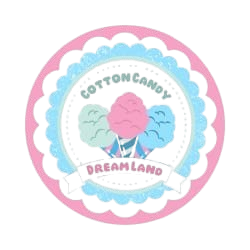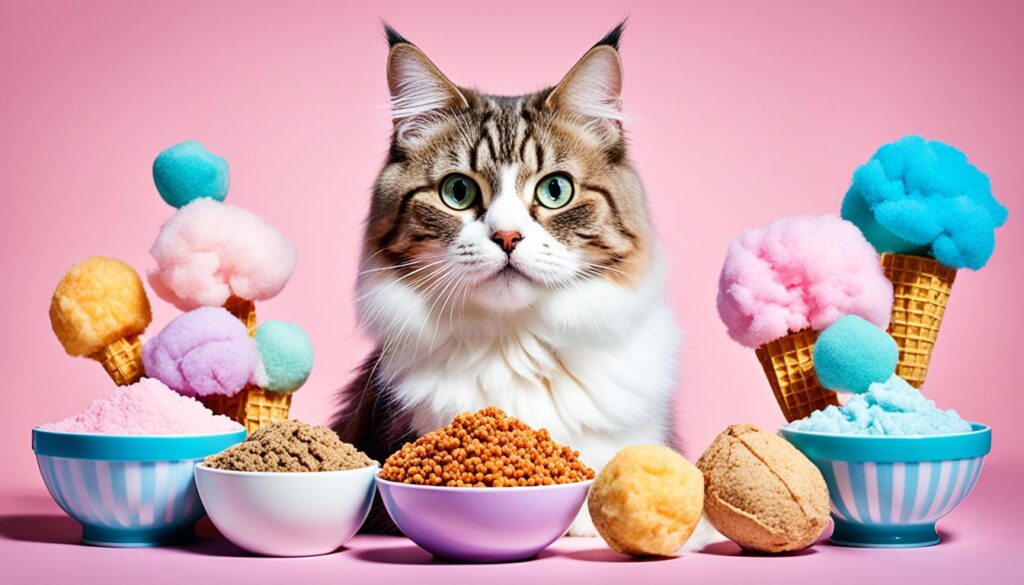“Can Cats Eat Cotton Candy?” is a question many curious pet owners might ask, but the answer is a clear no. Cats should not eat cotton candy, as it is made almost entirely of sugar, which can lead to serious health issues like obesity, diabetes, and digestive problems.
As a pet owner, you might want to share your favorite treats with your cats. But, it’s key to know what’s best for their diet. This article looks into if cats can eat cotton candy, a sweet treat many love.
Can Cats Eat Cotton Candy? Additionally, artificial flavors and colors found in cotton candy can be harmful to cats. To keep your feline friend healthy, it’s best to avoid giving them sugary treats like cotton candy.
Cats need certain nutrients found mainly in animal proteins to stay healthy. Their bodies aren’t made to handle the sugar and artificial stuff in treats like cotton candy. Giving your cat these treats can cause health problems and upset their diet.
Cats are naturally curious creatures, especially when they see their humans enjoying a sweet treat. If you’ve ever had cotton candy around your feline friend, you may have noticed them sniffing or even trying to sneak a bite. But is it safe for cats to eat cotton candy? The short answer is no—cotton candy is not suitable for cats and could pose potential health risks. Let’s explore why.
Why Cotton Candy Is Not Safe for Cats
Cotton candy is pure sugar, and cats lack the taste receptors for sweetness. Unlike humans, felines do not crave sugary treats because their bodies are not designed to digest sugar efficiently. Eating too much sugar can lead to digestive issues, weight gain, and even long-term health problems like diabetes. While a small lick of cotton candy may not cause immediate harm, it offers absolutely no nutritional value for your cat.
The Hidden Dangers of Sugar and Artificial Additives
Beyond the sugar content, cotton candy often contains artificial flavors and food coloring, which can be harmful to cats. Some artificial sweeteners, like xylitol, are extremely toxic to pets, causing a sudden drop in blood sugar levels that can be life-threatening. While cotton candy typically does not contain xylitol, the risk of other additives causing stomach upset or allergic reactions still exists.
Choking Hazard and Digestive Problems
Another concern with cotton candy is its light, fibrous texture, which might seem harmless but can become a choking hazard if a cat tries to eat too much at once. Since cotton candy dissolves quickly in saliva, it might not be as dangerous as solid candy, but ingesting too much could lead to stomach pain, vomiting, or diarrhea. Additionally, too much sugar in a cat’s diet can disrupt their gut bacteria, leading to long-term digestive issues.
Key Takeaways
- Cats are obligate carnivores and require a protein-rich diet, not sugary human snacks.
- The high sugar content and artificial ingredients in cotton candy can be harmful to cats.
- Feeding your cat cotton candy or other human foods can lead to health problems, such as weight gain, digestive issues, and dental problems.
- It’s important to consult your veterinarian for guidance on your cat’s nutritional needs and appropriate treats.
- Stick to healthy, cat-friendly snacks to keep your feline friend happy and healthy.
Understanding Cat Nutrition
As pet owners, knowing what our cats need to eat is key. Cats need animal-based proteins as their main food source. A good cat nutrition plan includes proteins, fats, carbs, vitamins, and minerals for health.
Cats’ Dietary Requirements
Cats have special nutritional needs. They need more protein and amino acids like taurine for heart and eye health. They also need more fat for energy and healthy skin and coat.
The Importance of a Balanced Diet
- A balanced feline diet prevents health issues and nutritional shortages.
- It supports a strong immune system, healthy digestion, and good energy.
- It also lowers the risk of pet food safety issues, like animal toxicity from human foods.
Knowing about cat nutrition helps you make good choices for your cat. This ensures they stay healthy and happy for a long time.
Cotton Candy: A Sugary Treat
Cotton candy is a favorite at carnivals and parties. It’s loved by people of all ages. But, it’s not safe for cats.
Ingredients in Cotton Candy
The main part of cotton candy is sugar, or sucrose. This makes it light and fluffy. It also has flavorings and colorings to taste better and look nice.
These ingredients are okay for people but not for cats. Cats need different foods than humans. Giving them cotton candy can hurt their health.
| Ingredient | Potential Risks for Cats |
|---|---|
| Sugar (sucrose) | Can lead to weight gain, diabetes, and other health issues in cats |
| Flavorings | May contain artificial additives that are difficult for cats to digest |
| Colorings | Some synthetic dyes used in cotton candy can cause allergic reactions in cats |
Can Cats Eat Cotton Candy?
No, cats should not eat cotton candy. It’s not good for their diet and can harm their health. Cats can’t digest a lot of sugar well, which can cause health problems.
Cotton candy looks tasty but is bad for cats. Cats need meat to stay healthy. Cotton candy has too much sugar and fake stuff that can make cats sick.
“Cats are unable to metabolize sugar efficiently, and consuming too much can result in weight gain, diabetes, and other health problems.”
Cotton candy can also make cats choke or hurt their teeth. Cats clean themselves and eating cotton candy can cause blockages or stomach problems.
Safer Alternatives for Feline Treats
Don’t give your cat pet treats like cotton candy. Here are better choices:
- Small pieces of cooked, unseasoned chicken or turkey
- Freeze-dried meat or fish-based treats
- Catnip or cat grass
- Dental chews specifically designed for cats
Always talk to your vet before trying new foods or treats. This keeps your cat safe and healthy.
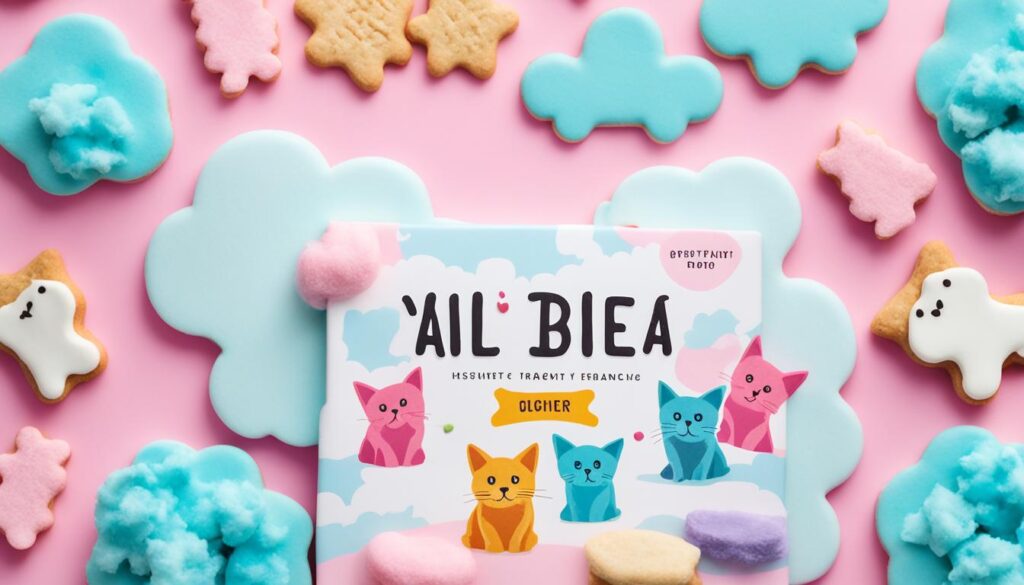
Keep cotton candy and sugary snacks away from your cat. Give them the right food and treats to stay happy and healthy.
Potential Risks of Feeding Cats Cotton Candy
Cats might like the sweet, fluffy taste of cotton candy. But, it’s important to know the risks of giving it to them. Cotton candy has a lot of sugar, which is bad for cats.
Sugar Overload
Feeding cats cotton candy gives them too much sugar. This can cause stomach problems like diarrhea and vomiting. It can also make them gain too much weight and become obese.
Cats can’t handle a lot of sugar. This can harm their health a lot.
Dental Issues
Cotton candy’s sugar content can also harm a cat’s teeth. The sugar can stick to their teeth, causing cavities and gum disease. This can make your cat feel bad and lead to bigger health problems.
Keeping our pets safe and healthy is very important. It’s key to feed them safely and keep them away from harmful foods.
“Cats are obligate carnivores, meaning they require certain nutrients found primarily in animal-based foods. Feeding them a diet high in sugar can disrupt their natural digestive processes and lead to serious health issues.”
Alternative Healthy Treats for Cats
Don’t give your cat cotton candy. It’s full of sugar. Instead, give them healthy treats that fit their diet. These treats can make your cat happy and healthy.
Try giving them small pieces of cooked, unseasoned chicken or tuna. These are full of protein and good for their diet. Freeze-dried meat treats are also great. They’re crunchy and taste good to cats.
For a sweet treat, give them cat-safe fruits and veggies. Carrots or green beans are good choices. They give your cat vitamins and minerals safely.
| Healthy Cat Treat | Nutritional Benefits |
|---|---|
| Cooked Chicken | High in protein, essential for muscle and tissue health |
| Tuna | Rich in omega-3 fatty acids, promoting a healthy coat and skin |
| Freeze-Dried Meat Treats | Concentrated flavor and crunchy texture that cats love |
| Cooked Carrots | Good source of beta-carotene, supporting eye health |
| Green Beans | Fiber-rich, helping maintain a healthy digestive system |
Try these healthy treats for your cat. They’re tasty and good for them. Always talk to your vet about what’s best for your cat’s diet.
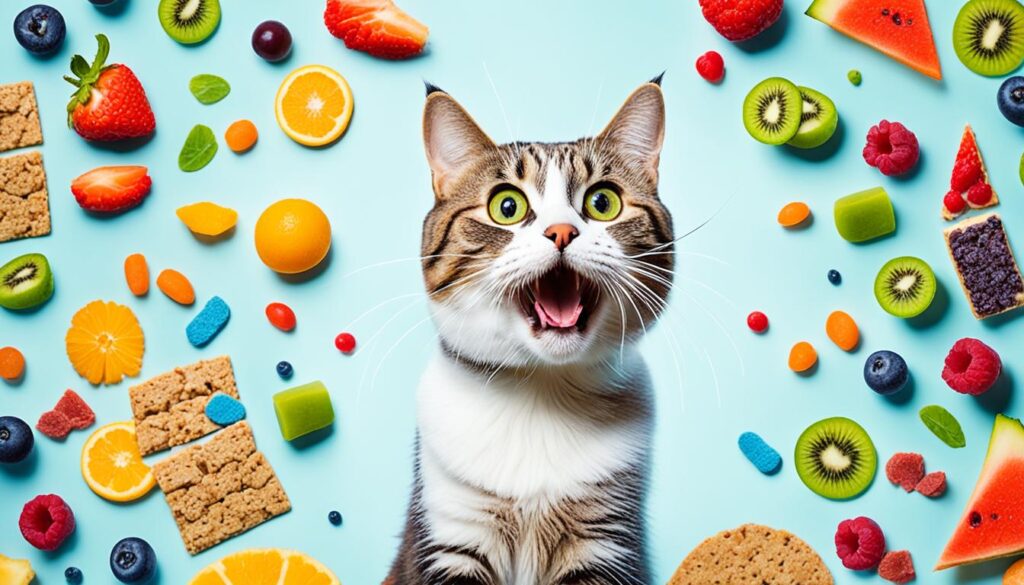
Consulting Your Veterinarian
Getting advice from a vet is key for your cat’s diet. They know a lot about pet food safety and what your cat needs. Your vet can guide you on what’s best for your cat.
Professional Advice on Pet Nutrition
If you’re not sure about a food or treat for your cat, talk to your vet. They can give advice based on your cat’s needs. This way, you can avoid risks and keep your cat healthy.
Your vet can also spot and fix any diet-related health issues. They might suggest supplements or changes to your cat’s diet. This helps your cat stay well.
“Regular check-ups and open communication with your veterinarian are the keys to maintaining your cat’s optimal health and nutrition.”
Your vet is your go-to person for your cat’s diet. Their advice is key to keeping your cat happy and healthy.
Feline-Friendly Snacks
Healthy treats can be a great way to bond with your cat. It’s important to choose treats that are high in protein and low in sugar. This helps meet your cat’s nutritional needs and satisfies their snack cravings.
Nutritious Options for Cats
Here are some great snack choices for your cat:
- Small pieces of cooked, unseasoned chicken or fish
- Freeze-dried meat treats made specifically for cats
- Plain, unsweetened yogurt in moderation
- Bite-sized servings of cat-safe fruits like blueberries
- Steamed, unsalted vegetables such as broccoli
These snacks are tasty and good for your cat’s health. They don’t have sugar like human treats do. They’re made with your cat’s diet in mind.
| Healthy Pet Treats | Nutritional Benefits |
|---|---|
| Cooked Chicken or Fish | High in protein, low in fat |
| Freeze-Dried Meat Treats | Concentrated source of protein |
| Plain Yogurt | Provides probiotics and calcium |
| Blueberries | Rich in antioxidants and fiber |
| Steamed Broccoli | Packed with vitamins and minerals |
Adding these pet treats, feline diet, and human food for pets to your cat’s diet is good for them. It gives them the nutrition they need and makes them happy.
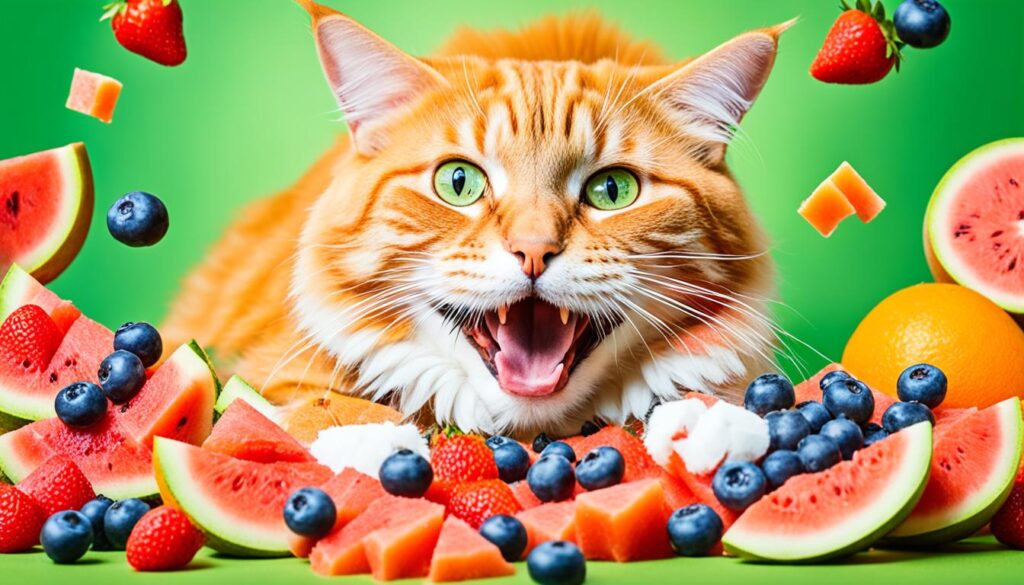
Human Foods to Avoid
Sharing your snacks with your cat might seem nice, but many human foods are bad for them. As a pet owner, knowing what to feed your cat is key for their health. Here are some foods that are harmful to cats.
Potentially Harmful Foods for Felines
- Chocolate – Chocolate has theobromine, which is toxic to cats. It can cause vomiting, diarrhea, and seizures.
- Onions and Garlic – These can hurt your cat’s red blood cells. This leads to anemia and health issues.
- Grapes and Raisins – Eating these fruits can cause kidney failure in cats.
- Artificial Sweeteners – Sweeteners like xylitol can lower a cat’s blood sugar too much.
Other foods might look safe but can still be risky for cats, like fatty foods, salt, and caffeine. Always choose a safe, balanced diet for your cat to keep them healthy and happy.
“The safety and well-being of our pets should always be our top priority when it comes to their diet.” – Dr. Sarah Johnson, Veterinary Nutritionist
Knowing the risks of human foods for pets helps keep your cat safe and healthy. Always choose safe foods for your pet to avoid any problems.
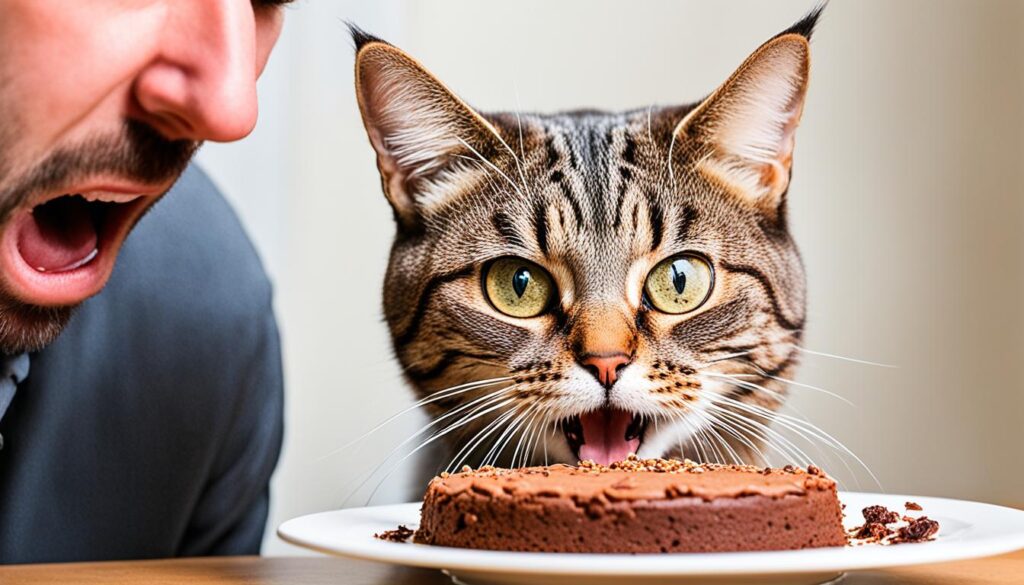
Monitoring Your Cat’s Diet
Keeping your cat healthy starts with watching their diet. It’s key to notice their eating habits, weight changes, and how they react to food or treats. This helps make sure they get the right cat nutrition and spot problems early.
Watch for changes in how much your cat eats or their weight. If they’re losing or gaining weight, or eating a lot more or less, check it out. These signs might mean they have a health issue or need a different pet food safety plan.
| Monitoring Aspect | Potential Concerns | Recommended Action |
|---|---|---|
| Eating Habits | Increased or decreased appetite, sudden changes in feeding patterns | Consult your veterinarian to identify the cause and address any issues |
| Weight Fluctuations | Unexplained weight loss or gain | Monitor closely and discuss with your vet to determine the underlying reason and appropriate dietary adjustments |
| Response to Food | Vomiting, diarrhea, or other gastrointestinal issues after consuming certain foods | Eliminate the problematic food from your cat’s diet and consult your veterinarian for dietary recommendations |
Talking regularly with your vet about your cat’s diet is also key. They can make sure your cat gets the right cat nutrition. They can also suggest changes to your cat’s feline diet and pet food safety plan.
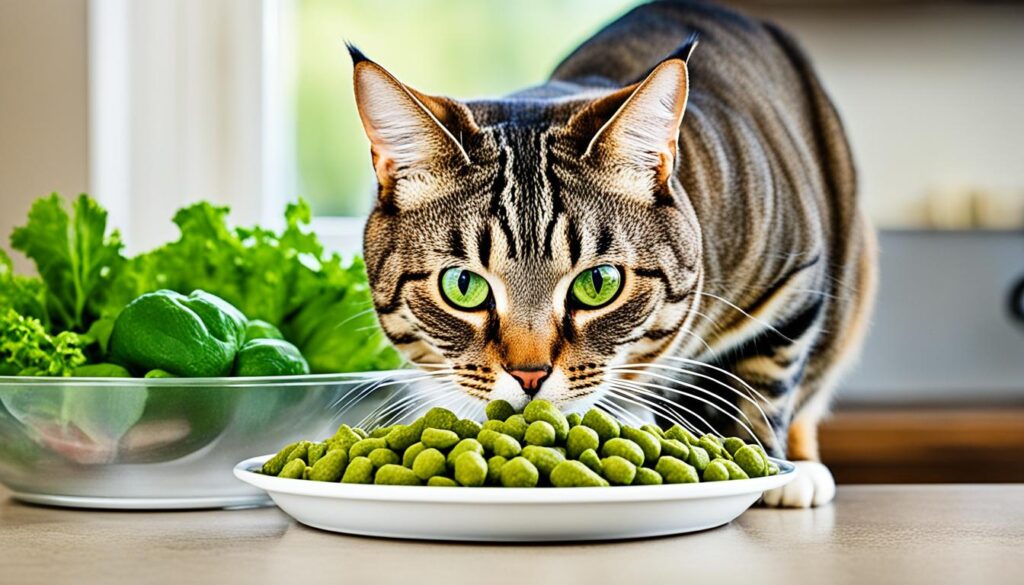
Your cat’s health is very important. Watching their diet closely is a big part of keeping them happy and healthy. By being alert and working with your vet, you can help your cat live a long, good life.
Signs of Dietary Issues in Cats
Keeping your cat’s nutrition and feline diet healthy is key for their well-being. Cats might show signs they’re not getting what they need or have eaten something bad. Knowing these signs helps you spot problems early and fix them.
Recognizing Potential Problems
Watch for these changes in your cat’s behavior or looks:
- Changes in appetite, such as increased or decreased hunger
- Unintentional weight loss or gain
- Frequent vomiting or diarrhea
- Lethargy or lack of energy
- Dull, dry, or poor coat condition
- Skin irritations or changes
These signs might mean your cat’s feline diet lacks nutrients or they ate something bad. It’s key to fix these issues fast to keep your cat healthy.
“Paying attention to your cat’s behavior and physical changes can help you identify potential dietary issues early on, allowing you to work with your veterinarian to address the problem and keep your feline friend healthy.”
Stay alert and work with your vet to make sure your cat’s cat nutrition is right. This way, you can catch and fix any problems fast. Your cat’s health and happiness are very important.
The Risks of Feeding Cats Table Scraps
Sharing your favorite treats with your cat might seem nice, but it can be harmful. Many foods safe for humans are bad for cats. This is because cats need a special diet and have sensitive stomachs.
Cats need to eat mostly animal proteins to stay healthy. Foods high in sugar, salt, or spices can upset their diet. This can lead to health issues.
- Digestive issues: Table scraps can cause stomach problems, like vomiting, diarrhea, and not wanting to eat.
- Weight gain: Giving your cat human food can make them overweight. This raises the risk of more health problems.
- Nutrient imbalances: Table scraps often lack important vitamins and minerals. This can cause health problems over time.
- Toxicity: Foods like onions, garlic, and chocolate are toxic to cats. They can make cats very sick or even kill them.
For your cat’s health, stick to a special cat food diet. Don’t give them human food. If you’re not sure about a food, talk to your vet before giving it to your cat.
By focusing on your cat’s diet, you keep them healthy. This stops the risks of giving them table scraps.
| Human Food | Toxicity to Cats |
|---|---|
| Onions and Garlic | Can cause anemia and damage red blood cells |
| Chocolate | Contains theobromine, which is toxic to cats |
| Grapes and Raisins | Can cause kidney failure in cats |
| Xylitol | An artificial sweetener that can cause a dangerous drop in blood sugar and liver damage |
Keeping Your Cat Healthy and Happy
Feeding your cat a balanced diet is key to their health and happiness. It’s important to know what they need, avoid bad foods, and give them safe treats. This helps your cat stay healthy.
A Well-Balanced Approach
Talk to your vet for advice on what to feed your cat. They can help you keep your cat’s diet right. This way, you avoid giving them sugary foods like cotton candy. Keeping your cat safe from bad foods is crucial for their health.
Healthy and Safe Alternatives for Your Cat
If your cat seems interested in sweets, there are much healthier alternatives to offer instead of cotton candy. Small portions of cat-safe fruits like blueberries, strawberries, or melon can be an occasional treat. However, always introduce new foods gradually and in moderation. You can also try catnip or special cat treats designed to satisfy their curiosity without any harmful effects.
Final Verdict: Keep the Cotton Candy Away
While a tiny taste of cotton candy is unlikely to cause serious harm, it’s best to avoid giving it to your cat altogether. Felines thrive on a protein-rich diet, and sugary foods like cotton candy do nothing but pose potential risks. If you want to treat your cat, opt for healthier, pet-friendly options that support their overall well-being. Next time you’re enjoying cotton candy, keep it out of paw’s reach and stick to treats that keep your furry friend happy and healthy!
